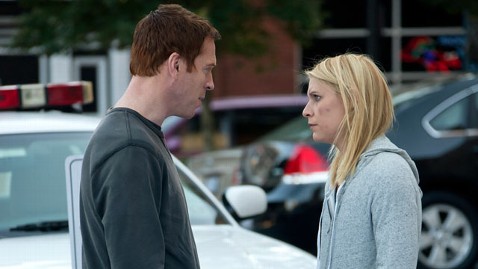‘Homeland’ Executive Producer on ‘Excruciating’ Finale and Season Two

Damian Lewis as Sgt. Nicholas Brody and Claire Danes as Carrie Mathison in "Homeland."
If you watched Sunday's season finale of " Homeland," Showtime's much-lauded, Golden Globe-nominated, hell of a thriller, you probably have a lot of questions. ABCNews.com talked with executive producer Howard Gordon to get the story on why season one ended the way it did and what's to come in "Homeland's" next installment.
(Of course, if you haven't seen the episode, look away, get thee to a TV, hunker down for 90 minutes, and come back. Spoilers abound.)
ABCNews.com: Did you consider having Brody successfully detonate the vest?
Gordon: That was probably the most obvious possibility. One of the biggest sources of debate was actually taking Brody to the moment of trying to detonate it and failing, because that indicated a level of intent and commitment that we would have to come back from. It really demonstrated his commitment to what he was doing at that moment.
We attempted to make it as excruciating as possible for the audience, to have this tragic misunderstanding of events. Carrie predicts the outcome but isn't aware of it. All those multiple ironies, the timing of it, that Saul betrays her, that she has to go to Dana - all those things kind of came together. It didn't have the satisfaction of the standard hero disarming the bomb and everyone going home.
ABCNews.com: What happens with Carrie now? Will she return to the CIA? Become a CIA consultant?
Gordon: We haven't written anything yet. We're just talking, but it's pretty clear that her CIA career is over, at least in the short term. We're going to insinuate her into the story and we have plans for that, but you can't reset and pretend the past didn't happen.
ABCNews.com: Why have Carrie seek treatment now, after she all but denied that she had a disease earlier in the season?
Gordon: It's really Brody, in that last moment outside the police station. That moment is the defining moment for Carrie where she can't take it anymore. It's a combination of how heartsick she feels and the mania being too strong for her. Carrie has a very active hand in deciding to go in for ECT [electroconvulsive therapy].
ABCNews.com: How much will Carrie forget?
Gordon: Of course in the short term she's going to forget the epiphany she had moments before the ECT. Presumably that would come back at some point, or not. anything is fair game.
ABCNews.com: Let's talk about Brody's wife, Jessica. How could she know so little when Dana was so attuned to his changes?
Gordon: There's a very special bond between Dana and her dad. It has the uncomplicated love that he doesn't have with his wife. Jessica had a lot of stuff going on. Her head's been spinning. Some part of her is still in love with Mike. She obviously had this very traumatic reentry with her husband which included his post traumatic stress and strange sexual behavior. I'd argue that she has a lot more on her plate than Dana regarding Brody. That also includes having to consider being the wife of a politican.
ABCNews.com: Did you consider having her confrontation with Carrie be more intense or violent?
Gordon: We wanted to avoid a cat fight. The police intervened but the energy of it all was close to that.
ABCNews.com: So how will season two begin?
Gordon: We have some ideas but none worth telling yet. We're at the point in the season where you put a lot of ideas on the table and how you arrange them and where you put them is something that remains to be seen.
ABCNews.com: When we first spoke, you said that you hadn't seen any backlash from the military or intelligence communities. Has that changed?
Gordon: I have a few friends in the military who I've been corresponding with. I don't know if they're being polite or it's their friendship but they seem to really like it. As far as the intelligence community, they've been very cooperative. They haven't exactly been sending us fan mail, but we have a good working relationship.